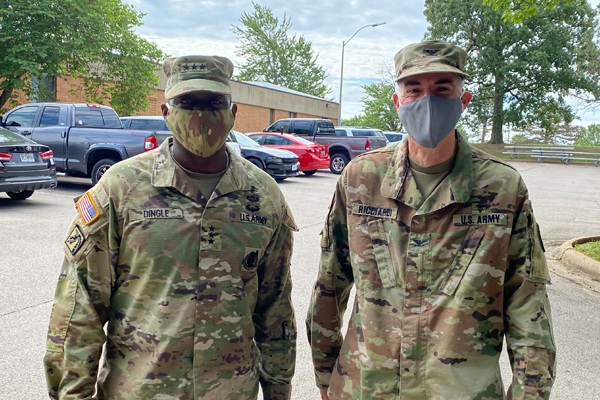Professor and Director of Strategic Partnerships at the Center for Health Policy and Media Engagement Richard Ricciardi, Ph.D., CRNP, FAANP, FAAN, gets pulled out of retirement
If life were a movie, a grizzled Richard “Ric” Ricciardi would have been splitting firewood at the end of a long driveway when Department of Defense officials drove up and told him the world needed him to come back to work. It wasn’t that dramatic, but the DoD certainly caught Ricciardi off guard when it asked for his help to run a field hospital at the Missouri-based Fort Leonard Wood.
“Originally, I was shocked to be honest with you. I was retired. I just figured I would never put on a uniform again,” said Ricciardi, director of strategic partnerships at GW’s Center for Health Policy and Media Engagement and professor of nursing. He is also president of Sigma Theta Tau, the international nursing honor society.
The military’s ask wasn’t that unusual, however. A 66P (family nurse practitioner), Ricciardi had worked at the Agency for Healthcare Research and Quality (AHRQ), part of the U.S. Department of Health and Human Services, and he was very familiar with public health models. Where most Army colonels had retired or were working in administrative roles, Ricciardi kept one foot in clinical practice his entire career and was still certified to practice in Maryland.
“It really wasn’t my Ph.D. that got me called back. It was that I was still practicing as a clinician,” he said. “For me, they kind of got a twofer.”
When the initial shock wore off, Ricciardi felt a sense of pride and honor. “I’ve always been very proud of this country, the American Dream, and what the country stands for,” he said. “To be asked by the Department of Defense to participate in a national emergency—I felt honored to be asked. If your nation calls and really needs you, if there’s something I can do to make the world a little bit better during a national emergency, I definitely should consider it.”
Before making the big decision, Ricciardi talked to his wife—who was supportive—and to Jeffries, who gave him the green light on GW’s end. He said yes to the DoD, received his orders, and then things moved very quickly.
At the fort, Ricciardi is working out of an old dental clinic and oversees screening of incoming populations and sets the fort’s public health responses to prevent potential spread of the virus among trainees. Part of that means designing training “bubbles” for recruits and arranging sleeping accommodations in safe ways. (Trainees sleep head-to-feet and feet-to-head.) Ricciardi didn’t want to identify the fort’s population but said he has screened people “in the thousands.”
“In the field, it’s about really trying to figure out if there’s another way to do something like scaling a wall in a different way, or is that really something that is required in the training. Can that be left out? Can you just have the person do it on their own?” he said. “The critical element is trying to have reasonable assurance that when people are training together that you have taken out the individuals that either have COVID or are at risk for COVID.”
In high-pressure conditions, self-care is important for healthcare workers too, and Ricciardi relaxes by going on walks in the nearby Ozark Mountains. (He posts his stunning flora and fauna photos on Flickr and also writes poetry.) “It’s one way for me to unwind,” he said. “I’d never been to this part of the country before, so it’s quite striking how beautiful the countryside is. The good news is you’re out in the countryside by yourself. There’s no risk of COVID.”
Photographing and writing helps Ricciardi escape temporarily from overwhelming times with economic challenges, systemic racism, and the pandemic, he said. But looking forward, he is optimistic about some of the promises of telemedicine, which can handle certain health conditions more efficiently, and cheaply, than an in-person office visit.
“COVID, in some ways, has been an opportunity for healthcare to advance and improve its efficiencies, effectiveness, and its customer service via telehealth and other modalities,” he said. “The paradigm of primary care will change to allow for more of this innovation around telehealth to be incorporated in a visit.”
“I think consumers are going to demand it and say, ‘I didn’t have to get in my car and drive. I could actually see my provider without leaving work. It worked out well. Why can’t I keep doing that?’” he added. “I suspect for certain kinds of medical issues, consumers will demand it.”


